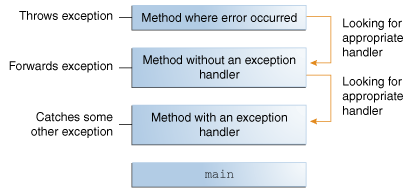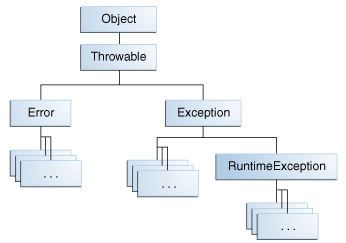标签:
The term exception is shorthand for the phrase "exceptional event."
Definition: An exception is an event, which occurs during the execution of a program, that disrupts the normal flow of the program‘s instructions.

Searching the call stack for the exception handler.
The first kind of exception is the checked exception. These are exceptional conditions that a well-written application should anticipate and recover from.
Checked exceptions are subject to the Catch or Specify Requirement. All exceptions are checked exceptions, except for those indicated by Error, RuntimeException, and their subclasses.
The second kind of exception is the error. These are exceptional conditions that are external to the application, and that the application usually cannot anticipate or recover from.
Errors are not subject to the Catch or Specify Requirement. Errors are those exceptions indicated by Error and its subclasses.
The third kind of exception is the runtime exception. These are exceptional conditions that are internal to the application, and that the application usually cannot anticipate or recover from.
Runtime exceptions are not subject to the Catch or Specify Requirement. Runtime exceptions are those indicated by RuntimeException and its subclasses.
Errors and runtime exceptions are collectively known as unchecked exceptions.

The Throwable class
Valid Java programming language code must honor the Catch or Specify Requirement. This means that code that might throw certain exceptions must be enclosed by either of the following:
A try statement that catches the exception. The try must provide a handler for the exception, as described in Catching and Handling Exceptions.
A method that specifies that it can throw the exception. The method must provide a throws clause that lists the exception, as described in Specifying the Exceptions Thrown by a Method.
Code that fails to honor the Catch or Specify Requirement will not compile.
Some programmers consider the Catch or Specify Requirement a serious flaw in the exception mechanism and bypass it by using unchecked exceptions in place of checked exceptions. In general, this is not recommended. The section Unchecked Exceptions — The Controversy talks about when it is appropriate to use unchecked exceptions.
Generally speaking, do not throw a RuntimeException or create a subclass of RuntimeException simply because you don‘t want to be bothered with specifying the exceptions your methods can throw.
Here‘s the bottom line guideline: If a client can reasonably be expected to recover from an exception, make it a checked exception. If a client cannot do anything to recover from the exception, make it an unchecked exception.
参考:Exceptions
标签:
原文地址:http://my.oschina.net/yinjq/blog/416973